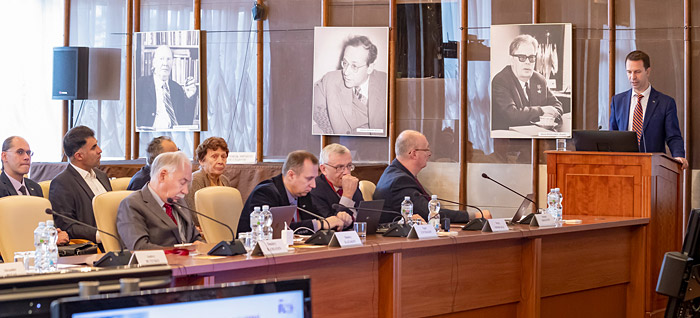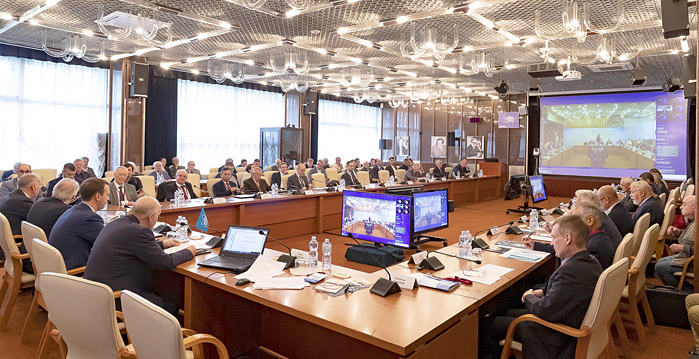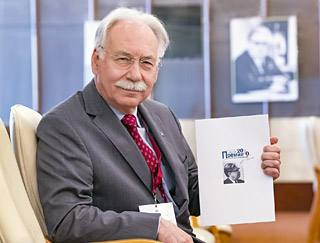
Electronic english version since 2022 |
The newspaper was founded in November 1957
| |
|
Number 36 (4684) |
At the 134th session of the Scientific Council
A solid foundation for a new Seven-Year Plan
On 21-22 September, the 134th session of the JINR Scientific Council was held at the JINR International Conference Centre, chaired by Academician of the National Academy of Sciences of Belarus Professor Sergey Kilin.
The report by the Chairman of the Scientific Council, JINR Director and RAS Academician Grigory Trubnikov opened the programme of the session. The report was dedicated to the resolutions adopted at the meeting of the Committee of Plenipotentiaries of the JINR Member States held in March 2023, the implementation progress of the current Seven-Year Plan for the Development of JINR (2017-2023), as well as significant events in the scientific life of the Institute.
About the scientific life of the Institute
JINR Director noted the successful work of the MPD, BM@N, ARIADNA Collaborations of the NICA Megascience Project and the team of VBLHEP at JINR during the fourth commissioning run (September 2022 - March 2023), the longest in the history of the project.

A new Pu-227 isotope was discovered at the FLNR Superheavy Element Factory and the first alpha-, beta- and gamma-spectroscopy experiment was carried out. Progress was made in the development of the DRIBs-III Accelerator Complex. The modernization of the U-400M Cyclotron is close to the final stage. The first stage of construction work of the DC-140 Cyclotron has been completed and the engineering networks for the construction of the U-400P Cyclotron have been prepared.
The JINR Multifunctional Information and Computing Complex is currently developed at MLIT. During the latest modernization of the Govorun Supercomputer, the overall peak performance of the supercomputer reached 1.7 petaflops with double precision. In 2023, the JINR Tier-1 Centre ranked second in the world in terms of productivity among other Tier-1 centres of the CMS experiment. The DIRAC distributed platform is used to support all fundamental experiments at NICA, as well as the Baikal-GVD Project. A digital ecosystem integrating services to support scientific, administrative, financial and economic activities and to maintain the engineering and IT infrastructure of the Institute was launched at JINR.
"The main task and challenge for the next seven-year period is to engage qualified people from all over the world to work with all this unique infrastructure: detectors, accelerators, reactors," JINR Director noted in his commentary.

The LINAC-200 Electron Accelerator is currently prepared for commissioning at DLNP that will be brought to an energy of 800 MeV and launched in 2-3 years. The megascience project of the Baikal-GVD Deep Underwater Neutrino Telescope currently develops and has the status of the largest neutrino telescope in the Northern Hemisphere. JINR participates in neutrino projects, both external and internal. Three experiments at the Kalinin Nuclear Power Plant, i.e. DANSS, vGeN, and Ricochet, are among them.
Based on the development of an inter-laboratory research programme at LRB, fundamental and applied research in life sciences and condensed matter physics widely develops.
"I think that our very efficient inter-laboratory cooperation is the scientific power of the Institute. When laboratories work together on one big task, such science and such experiments are powerful and highly efficient," Grigory Trubnikov highlighted.
BLTP scientists obtained new results in the fields of elementary particle physics, atomic nucleus and condensed matter, as well as advanced mathematical physics.
The IBR-2 reactor at FLNP has been prepared for the further regular operation. Pending the receipt of new permits, the launch of the reactor is postponed until the autumn of 2024. The concept of an intense ultracold neutron source and a neutron trap currently develops.
The Joint Institute still carries out joint work with CERN, in particular, in the NA64 experiment. JINR scientists extensively participate in the research and modernization of the ATLAS, CMS, and ALICE detectors of the Large Hadron Collider.
As Grigory Trubnikov noted, the Institute develops as an international organization. As part of the implementation of the cooperation agreement signed with Mexico in February this year, a major visit of JINR representatives to this country took place. A representative of Mexico Ana Maria Cetto, ex-president of the Mexican Physical Society, professor of the National Autonomous University of Mexico (UNAM) joined the Scientific Council and became its active participant. The Joint JINR-China Coordination Committee was established after signing the Protocol with the People's Republic of China. Its first meeting dedicated to the elaboration of specific areas of cooperation was held in Dubna on 11 September. In addition, JINR representatives have been on working visits to Vietnam, Pakistan and India.
During the current seven-year period, JINR hosted 55 international conferences, 17 student schools. The number of publications in international journals exceeded 2.100 articles.
At the meeting, a member of the Scientific Council, President of the International Union of Theoretical and Applied Physics (IUPAP) Michel Spiro proposed to resume the joint school for young scientists of CERN and JINR. He is going to make this proposal at a meeting of the CERN Scientific Committee.
About the project of the new Seven-Year Plan
Grigory Trubnikov presented an updated draft of a new Seven-Year Plan for the Development of JINR for 2024 - 2030. In May-June of this year, a group of experts, headed by JINR Scientific Leader RAS Academician Victor Matveev considered the text of the Seven-year programme. "We are grateful to the members of the Programme Advisory Committees and experts that discussed additional aspects at the PAC meetings, later included in the document, made comments and observations," the JINR Director noted.
In June-July, an additional estimation of the document concerning scientific research and the large research infrastructure of JINR was carried out. In August, additions to the projects of NICA, Baikal-GVD and others were made.
The work on changes in the Topical Plan for JINR Research and International Cooperation is in progress. Following the June meetings of the Programme Advisory Committees, the PAC chairmen Itzhak Tserruya, Valery Nesvizhevsky and D?nes Lajos Nagy presented proposals for the extension of current topics and the opening of a number of new ones to the members of the Scientific Council.
The members of the Scientific Council noted the need to expand the areas of advanced research and development of JINR in beam and accelerators physics. The preparatory work carried out at the Institute to restructure the topical plan with the opening of the corresponding inter-laboratory topic was discussed. According to the SC members, all these actions create a firm foundation for the further development of the Institute in the new seven-year period.
The JINR Directorate proposed to include some topics and projects in a category "Major research infrastructure projects". The Baikal-GVD Neutrino Telescope and the development of the DRIBs-III Project at FLNR that includes the construction of the U-400R Accelerator Complex and the development of experimental facilities for studying the chemical and physical properties of superheavy elements were among them.
The participants of the event considered the opening of two new projects within the framework of Nuclear Physics until the end of 2028, namely, "Investigation of heavy and superheavy elements" and "Light exotic nuclei at the borders of nuclear stability". They mainly aim to synthesize superheavy elements and to study their nuclear and atomic (chemical) properties and the mechanisms of nuclear reactions.
Within the framework of the Condensed Matter Physics, the participants of the meeting discussed the opening of new projects "The new advanced neutron source at JINR" (the NEPTUN-3 Reactor), "Protection against physical and chemical stresses with tardigrade proteins (TARDISS)" and "Nanobiophotonics". The research programme of the latter is interdisciplinary and is aimed at both fundamental and applied research.
New appointments
At the session, Makondelele Victor Tshivhase, appointed as the Director of iThemba LABS in 2023, was elected a new member of the Programme Advisory Committee for Nuclear Physics. Doctor Tshivhase is a nuclear scientist specializing in the research of radioactive contamination of water and soil, cancer risk mapping and techniques for removing radiation from the environment that has previously headed the Centre for Applied Radiation Science and Technology (CARST) at North-West University. He will replace Zeblon Vilakazi, a former member of the PAC NP from South Africa since 2009.
At the session of the Scientific Council, election and approval of candidates for the vacant positions in the Directorates of the JINR Laboratories was held. Thus, Head of the Experimental Department of Nuclear Spectroscopy and Radiochemistry of DLNP, Doctor of Physics and Mathematics Evgeny Yakushev was elected new Director of the Laboratory of Nuclear Problems. The Scientific Council expressed gratitude to Vadim Bednyakov for his fruitful work as Director of the Laboratory since 2013.
The members of Scientific Council approved the positions of Deputy Directors of FLNP and MLIT. Yury Kopach and Sergey Kulikov became Deputy Directors of the Frank Laboratory of Neutron Physics. Chuluunbaatar Ochbadrakh, Nikolay Voitishin and Dmitry Podgainy became Deputy Directors of the Laboratory of Information Technologies.
Grigory Trubnikov announced vacant positions in the Directorates of the JINR Laboratories. In February 2024, at the 135th session of the JINR Scientific Council, its participants will elect the third DLNP Deputy Director. In September, at the 136th session, the members of the Scientific Council will elect the Director of the Laboratory of Radiation Biology. The Scientific Council has approved a proposal by the FLNP Directorate to open a position of the third deputy director because of the extension of the Laboratory and the range of its research work. The election of the third FLNP deputy director will be held at the135th session of JINR SC.
First Prize winners
On 22 September, the first winners of the Oganesson Prize, established at the suggestion and at the expense of RAS Academician Yuri Tsolakovich Oganessian, transferred to the Joint Institute for Nuclear Research in 2023, were announced. The founders of the Prize are the Scientific Leader of the Flerov Laboratory of Nuclear Reactions Yuri Oganessian and JINR.
The decision to award the Prize was made by a jury of international experts chaired by the Scientific Leader of the National Centre for Physics and Mathematics, Academician of the Russian Academy of Sciences Alexander Sergeev and approved by Director of JINR Academician of the Russian Academy of Sciences Grigory Trubnikov. Alexander Sergeev presented the first winners to the SC members. They were Ana Mar?a Cetto Kramis, Mikhail Shvydkoy, Valeria Pershina and Vasily Semin.

Alexander Sergeev introduced the first winners of the Oganesson Prize to the participants of the Session
A member of the JINR Scientific Council and professor at the National Autonomous University of Mexico Ana Maria Cetto Kramis was awarded for scientific work in quantum mechanics and theoretical physics, for great personal contribution to the strengthening of global scientific cooperation for peace and sustainable development.

Yuri Oganessian and Ana Maria Cetto Kramis
A Doctor of Arts, Art Director of the Moscow Musical Theatre, an ex-Minister of Culture of the Russian Federation, a cultural, social and public figure Mikhail Shvydkoy was presented the prize for personal contribution to the development of international scientific and cultural cooperation and the popularization of modern science achievements in mass media.
Valeria Pershina, a chemistry professor at the GSI Helmholtz Centre for Heavy Ion Research (Germany) was awarded the prize for theoretical investigations of the electronic structure and chemical properties of superheavy elements.
A young scientist, Head of the Scientific and Experimental Department of the FLNR Accelerator Complex at JINR Vasily Semin was awarded the OGANESSON Prize for significant personal contribution at the beginning of his scientific career to the development of new primary experimental facilities at FLNR JINR, providing breakthrough scientific results in nuclear physics.
"There is a very good tradition in Russian science when well-known academicians organize such funds, supporting their colleagues," Alexander Sergeev summed up. He gave an example of one of the first such prizes - the Macarius Prize for the Humanities, founded in 1867 that still exists today. "Yuri Oganessian is our outstanding scientist. It really was a very wise decision, a wise idea and I am very pleased to announce its first results," Alexander Sergeev said.
The OGANESSON Prize will be awarded annually for scientific achievements in fundamental and applied research in physics, chemistry, biology, as well as for science popularization.
Honorary Doctors of JINR
Victor Sadovnichy, Rector of Lomonosov Moscow State University, President of the Russian Rectors' Union, Academician, a member of the RAS Presidium and a professor was awarded the title "Honorary Doctor of JINR" for his outstanding contribution to the development of science, its popularization and promotion of international scientific cooperation by the decision of the Scientific Council. His research interests are mathematical simulation and mathematical methods of information processing. At the SC session, his significant contribution to the development of the spectral theory of differential operators was noted.
"JINR's cooperation with MSU has been going on for more than 60 years. We have two departments of the MSU branch in Dubna and we have joint plans to create two more departments, namely Big Data Sciences and the Department of Radiochemistry and Radiobiology," Grigory Trubnikov said.
Professor Denes Lajos Nagy, Honorary Research Professor at the Wigner Research Centre for Physics of the Hungarian Research Network (HUN-REN) that was also awarded the title "Honorary Doctor of JINR" at the session, has been a member of the JINR Scientific Council since 2002. Since 2000, with a short break, he has been an expert of the JINR Programme Advisory Committee for Condensed Matter Physics. Since 2017, he has been the Chairman of this Programme Advisory Committee. He is an outstanding Hungarian scientist in the field of M?ssbauer spectroscopy and nuclear resonance scattering of synchrotron radiation for determining the magnetic layer and domain structure of multilayer systems, as well as simulation, development and transformation of domain structures in these systems. Professor Nagy also works in close cooperation with colleagues from FLNP JINR in the field of neutron reflectometry of magnetic layers and the domain structure of multilayer materials.
Both new Honorary Doctors have been members of the Institute's Scientific Council for many years. In addition, JINR has strong long-term cooperation with the research centres they represent.
 |
| Dmitry Kazakov, BLTP Director |
At the session of the Scientific Council, Director of the Bogoliubov Laboratory of Theoretical Physics of JINR Dmitry Kazakov was awarded the Prize named after the second JINR Director Nikolay Bogoliubov.
"The Prize is awarded to both famous physicists and young scientists for outstanding work in the fields of theoretical and experimental physics," Grigory Trubnikov explained. Dmitry Kazakov, the winner of the Prize, presented a brief scientific report on renormalizability in quantum field theories to SC members.
In a festive atmosphere, JINR Director Grigory Trubnikov and JINR Scientific Secretary Sergey Nedelko presented diplomas for the 2022 JINR awards for the best scientific, scientific and methodological, scientific and technological applied papers to the JINR staff members. Grigory Trubnikov wished the winners good health and new scientific achievements.
The session was concluded with a general discussion and adoption of the Resolution of the Scientific Council.
Based on the information from JINR Press Office,
photo by Elena Puzynina